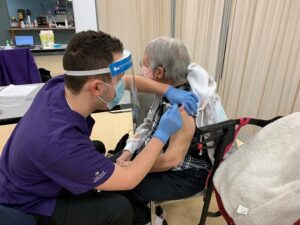Dilico Anishinabek Family Care administers 10,000 COVID-19 vaccinations

By Rick Garrick
Dilico Anishinabek Family Care’s nurses have now provided 10,000 COVID-19 vaccinations to Indigenous people in the 12 First Nations it serves and urban communities in northwestern Ontario.
“When the government announced vaccine availability and planning, we started planning right away because we are experienced in delivering and providing immunizations and vaccines to our First Nations,” says Natalie Paavola, director of Health Services at Dilico and a Namaygoosisagagun citizen. “So it was nothing really new to us in Health Services to start planning for [delivering COVID-19] vaccines for First Nations.”
Paavola says she assigned managers to work with each of the First Nations to develop a plan in preparation for when Dilico received the COVID-19 vaccines.
“The First Nation played an integral role as well in preparation,” Paavola says, noting that the First Nations prepared priority lists for the vaccination clinics. “So it was a collaborative effort — it wasn’t just us doing the work, it was with our First Nations and their co-operation.”
Paavola says they delivered the first vaccination clinics in Fort William, Long Lake #58, and Ginoogaming beginning in late February. Vaccination clinics were also held in Michipicoten, Pays Plat, Netmizaaggamig Nishnaabeg, Biigtigong Nishnaabeg, Red Rock Indian Band, Animbigoo Zaagi’igan Anishinaabek, Bingwi Neyaashi Anishinaabek, Kiashke Zaaging Anishinaabek, and Whitesand.
“[Fort William] was a huge clinic,” Paavola says. “We knew we had to provide a culturally safe place and access for vaccinations, so that’s what we did. We provided vaccine clinics right in the communities [staffed] by our nurses and our health care workers. [There were] a lot of people saying thank you, a lot of people feeling better now that they’ve received the first dose and they were looking forward to receiving the second dose.”
Paavola says there was a “really good response” from the communities about the vaccination clinics and vaccination clinic staff.
“They felt safe, they felt taken care of and they were very thankful that they were being provided the vaccine and being provided in a timely manner,” Paavola says. “It wasn’t an external organization, it wasn’t new faces [doing the vaccinations]. It was a lot of times their CHNs (community health nurses), managers that they work with on the ground — it was people they knew already so they trusted them and they felt safe to accept and take the vaccine. It made a huge difference.”
Paavola says they plan to continue doing COVID-19 vaccinations in the 12 First Nations.
“What’s going to happen now is you won’t see the mass vaccination clinics,” Paavola says. “You’ll see it become just another immunization or vaccine that the CHNs and nurses do within the communities.”
Darcia Borg, executive director at Dilico and a Red Rock Indian Band citizen, says she was “really proud of the hard work” the Health Services department did to support the communities.
“We have an outstanding team of accredited professionals that have provided thorough advocacy, ensured clinic logistics run smoothly and directly provided the vaccinations,” Borg says.
Dilico plans to continue coordinating with the First Nations and two local district health units to get as many Indigenous people immunized as possible.
“I am very honoured to be part of the strength, resilience and unity that is making an impact in reducing the number of positive cases in our district,” Paavola says. “Teamwork has made all the difference, without their effort we couldn’t have done any of this.”
Dilico also partnered with the Ontario Native Women’s Association to deliver COVID-19 vaccinations to the urban Indigenous population.


